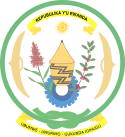- Constitution of Rwanda
-
Rwanda 
This article is part of the series:
Politics and government of
Rwanda- Constitution
- President
- Prime Minister
- Pierre Habumuremyi
- Parliament
- Political parties
- Elections
- Provinces
- Districts
- International Criminal Tribunal
for Rwanda - Foreign relations
The Constitution of Rwanda was adopted by referendum on May 26, 2003. It replaced the older Constitution of 1991.
The Constitution provides for a presidential system of government, with separation of powers between the three branches. It condemns the Rwandan Genocide in the preamble, expressing hope for reconciliation and prosperity.
External links
Constitution of Africa Sovereign
states- Algeria
- Angola
- Benin
- Botswana
- Burkina Faso
- Burundi
- Cameroon
- Cape Verde
- Central African Republic
- Chad
- Comoros
- Democratic Republic of the Congo
- Republic of the Congo
- Côte d'Ivoire (Ivory Coast)
- Djibouti
- Egypt
- Equatorial Guinea
- Eritrea
- Ethiopia
- Gabon
- The Gambia
- Ghana
- Guinea
- Guinea-Bissau
- Kenya
- Lesotho
- Liberia
- Libya
- Madagascar
- Malawi
- Mali
- Mauritania
- Mauritius
- Morocco
- Mozambique
- Namibia
- Niger
- Nigeria
- Rwanda
- São Tomé and Príncipe
- Senegal
- Seychelles
- Sierra Leone
- Somalia
- South Africa
- South Sudan
- Sudan
- Swaziland
- Tanzania
- Togo
- Tunisia
- Uganda
- Zambia
- Zimbabwe
States with limited
recognitionDependencies and
other territories- Canary Islands / Ceuta / Melilla / Plazas de soberanía (Spain)
- Madeira (Portugal)
- Mayotte / Réunion (France)
- Saint Helena / Ascension Island / Tristan da Cunha (United Kingdom)
- Western Sahara
 Rwanda topics
Rwanda topicsHistory Politics Chamber of Deputies · Constitution · Elections · Flag · Foreign relations · Law enforcement · Political parties · President · Prime Minister · Rwandan Defence Forces · SenateGeography Economy and infrastructure Demographics and society Culture Index • Portal Categories:- Constitution of Rwanda
- Government of Rwanda
- Politics of Rwanda
- Rwanda stubs
Wikimedia Foundation. 2010.
